Featured
377 Nigerians killed in Dangote Cement trucks accidents in 5 years as cement giant’s revenues soar
Published
5 years agoon
By
Editor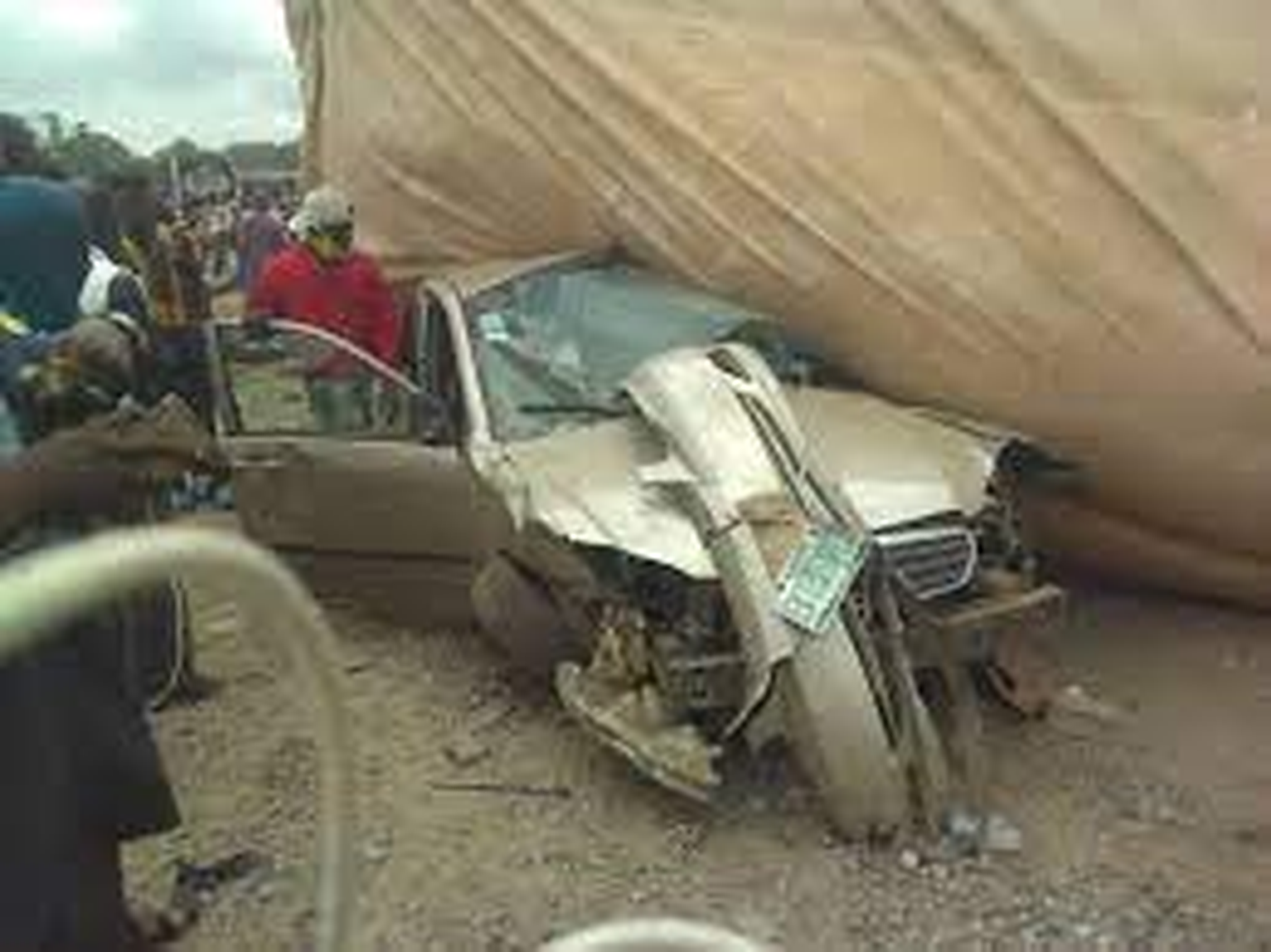
By Elijah Olusegun
Dangote Cement expanded in structure and revenue across Africa’s karst regions between 2015 and 2019. But the upswing—N891billion in the last nine months of 2019, up from N365.4 billion in 2015—has something else rising: the graph of volumes of gore and figures of broken bones. And that of body counts of Nigerians frequently heading into road traffic crashes (RTC) involving the company’s articulated vehicles trucking tons of cement across the nation.
In those four years, no fewer than 2,607 Nigerians were involved in 318 road accidents with the Sino-Truck vehicles the Dangote Group assembles for its use in Nigeria. In that period, about 54 percent of the road users fell victim: 377 died, 1040 got injured, according to the Federal Road Safety Corps (FRSC).
Of all the registered fleet owners in Nigeria, Dangote Cement leads in road traffic crash casualty figures. The company’s trucks were responsible for 96 percent to 98 percent of accidents that killed and injured those involved in RTC with the fleet operators within the period.
The fatality rate doesn’t only jump out at one reading its plotted graph. It gets to many Nigerians witnessing the horror.
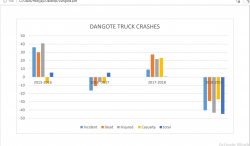
Percentage increase in Dangote truck accidents
On June 26, around Yewa North, Ogun, angry villagers set one of the trucks ablaze after it crushed a schoolboy going home. The villagers got angrier because the incident came days after a Dangote truck crushed a motorcycle rider and his passenger to death in the same Yewa North.
The LGA is obviously a hot spot for such accidents. The Ibese cement plant—the third of the Benue and the Obajana plants–belongs to the world’s richest black man Aliko Dangote. And it sprawls across 760 million tons of limestone in that region of Ogun.
More of Dangote Cement truck’s fatal accidents were recorded across the nation’s six regions within the month. But the pattern, based on the FRSC data, has been whipsawing.
For instance, the total number of those involved in the Dangote Cement truck cases rose between 2015 and 2016. The percentage increase bounded from 30.1 percent in 2015, diving to 19 percent a year later. It rose up again to 27 percent, and then fell to -29 percent between 2018 and 2019.
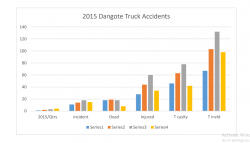
For the Yewa Dangote truck-motorcycle chain of calamities, the Ogun Traffic Compliance and Enforcement (TRACE) spokesperson, Babtunde Akinbiyi, blamed the drivers for the June 29 crash. The trucker, he said, lost control—because of over-speeding.
That was one of many horror stories featuring the Dangote Cement truckers as villains. One of the drivers in January, along the Ikorodu road, Lagos, lost it, and scaled into a BRT lane, broadsiding a bus with passengers on board. FRSC Sector Commander Clement Oladele said one trucker lost control along the Lagos-Abeokuta expressway Jan 2. Two of the passengers in the vehicles it crushed died. Others passengers were damaged. Another of Dangote trucks killed nine of the 18 passengers on board a bus in front of the Adekunle Ajasin University, Ondo, when it lost control January 24.
The Dangote Cement truckers crash elsewhere too, even where there is no limestone to quarry. In November 2015, a Dangote driver floor-boarded his truck carrying cement, lost control, and ran over an 18-sitter bus fully boarded in front of the NNPC in Asaba. Rindom Kumyen, FRSC sector commander in Delta, said the three vehicles involved in the crash went up in flames.
By nature, the company’s cement trucks drivers are road hogs. And that attitude combined with excessive speeding turn them into something worse—road demons, as far as many Nigerians know.
The National Daily requested by e-mail for proof the company addresses this recklessness among its truckers—if it ever believes the FRSC assessments of accident involving Dangote trucks. No official response yet—either admitting many of its drivers are rogues on the road or confirming sanctions for their recklessness.
In another e-mail request to the FRSC, the newspaper asked how much the Dangote Cement truckers worry the agency. No response as of the time of publishing the report.
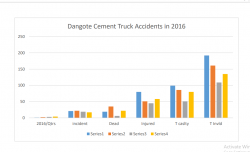
It seems easy to cast the drivers as jehus. However, the casual traffic watchers may not always be right in their assessment—that Dangote Cement truckers fail in safe driving, and so stand culpable for crashes. Every dog has its day.
In May, around Ago Oko Oba, still in Ogun, a Dangote truck crushed a rider and his two passengers—to death.
The mob was more rational in this incident.
Akinbiyi said the eyewitnesses confirmed the trucker wasn’t in the wrong.
“We gathered from eyewitness that the motorcycle was trying to overtake a Dangote truck from the right, unfortunately another speeding bike collided with the victims’ bike from the rear throwing them underneath moving truck on the fast lane,” he said.
“The three of them on the motorcycle were crushed to death in the process.”
Road safety experts also say it’s tricky blaming Dangote trucks for every fatal incident they have. No blame game serves justice until the FRSC has investigated a road crash, according to Adenusi Patrick, executive director, technical, Safety Beyond Borders.
“Sometimes, the Dangote drivers are at fault while sometimes other road users are at fault,” he told The Will in a report. Worse, road accidents, he noted, are hardly investigated in Nigeria.
This oversight and its complications have consequences. A raft of court cases by Dangote truck victims linger all over the courts. To prove liability is a hard nut.
Like the victims, the legal office also prosecutes traffic offences, civil and criminal, annually. It landed no fewer than 533 such cases in the first-three quarters 2016 alone. Likewise 324 cases in the first-two quarters of 2018. But there’s no published data on defendants in these cases who are road demons, including Dangote cement truckers.
More than 337 dying in Dangote Cement truck accidents in four years may not sound seismic. Car accidents claim more lives and limbs, according to the FRSC. Moreover, the truck mortality figure won’t make a hole in a population of over 200 million.
That a single money-spinning entity is responsible for the fatal trend, which has no end in sight, calls for concern.
You may like
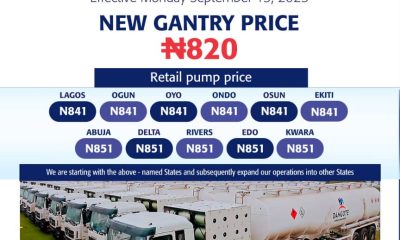

Dangote Refinery’s Direct Fuel Supply A Bold Step Toward Energy Independence
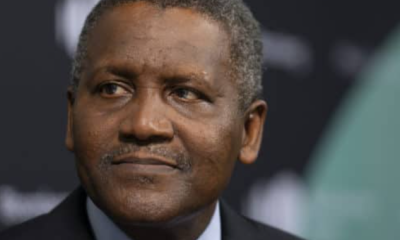

Fuel import ban: Dangote pushes for ‘Nigeria first’ policy, Marketers warn against monopoly


Nigeria’s power subsidy jumps to N1.94tn; Governors reject electricity act amendment


Gombe state records 72 road deaths, 171 crashes in six months


Dangote vows to slash cooking gas prices, threatens direct sales to consumers
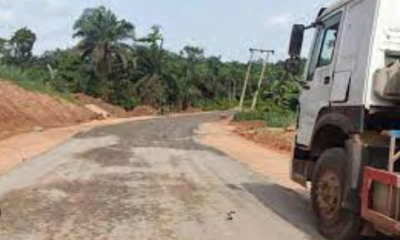

Kaduna roads: NURTW appeals to FG for urgent rehabilitation amidst rising fatalities
Trending

 Entertainment6 days ago
Entertainment6 days agoSimi addresses resurfaced 2012 tweets amid online backlash

 Health1 week ago
Health1 week agoSCFN, LUTH introduce bone marrow transplants as curative treatment for sickle cell

 Health4 days ago
Health4 days agoDeclassified CIA memo explored concealing mind-control drugs in vaccines

 Football1 week ago
Football1 week agoHarry Kane nets brace as Bayern edge Frankfurt 3–2 to go nine points clear

 Football1 week ago
Football1 week agoLate Flemming header stuns Chelsea as Burnley snatch 1–1 draw at Stamford Bridge

 Crime5 days ago
Crime5 days agoSenior police officers faces retirement after Disu’s appointment as acting IGP

 Education6 days ago
Education6 days agoPeter Obi urges JAMB to address registration challenges ahead of exams

 Health6 days ago
Health6 days agoNAFDAC issues alert on suspected revalidated SMA Gold infant formula

